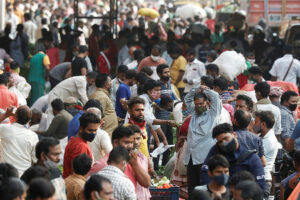JIM O’NEILL, the former Goldman Sachs Group, Inc. chief economist who coined the acronym BRIC, said the bloc of nations that later adopted the name should expand and work to counter the dollar’s dominance.
In a paper published in the Global Policy journal on March 26, Mr. O’Neill called on the group to apply strict criteria to ensure the addition of any new members to its ranks helps further its aims and urged it to focus on climate finance, improving healthcare and boosting trade.
“The US dollar plays a far too dominant role in global finance,” he wrote. “Whenever the Federal Reserve Board has embarked on periods of monetary tightening, or the opposite, loosening, the consequences on the value of the dollar and the knock-on effects have been dramatic.”
Brazil, Russia, India and China established BRIC in 2009 and the bloc became BRICS a year later when South Africa was admitted. If it expands to include other “emerging nations with persistent surpluses,” a globally fairer, multi-currency global system could emerge, Mr. O’Neill said.
He argues that the dollar’s dominance means the burden of dollar-denominated debt for other nations rises and falls with the exchange rate, destabilizing their own monetary policy, with the greenback’s movements ultimately playing a larger role than domestic decisions.
Still, the economist cautions that the group should only admit countries that meet the original criteria of having large populations and sizable economies with significant potential. He disagrees with its decision to include South Africa, by far the smallest BRICS country.
“If the main goal of BRICS as a group is symbolism, which it often seems to be, then attracting other, especially large-population emerging countries is understandable,” he said. But if there is an economic purpose “the criterion for including new members needs to be focused,” he wrote in the paper entitled “The Future of the BRICS and the New Development Bank”.
The group’s aims should include gaining a stronger voice in global institutions such as the World Bank and International Monetary Fund, Mr. O’Neill said. While BRICS accounts for 42% of the world’s population, its members have less than 15% of the voting rights in the two lenders, according to the Pretoria-based Institute for Security Studies.
BRICS plans to decide this year whether to admit new members and if so, what criteria to apply, Anil Sooklal, South Africa’s ambassador to the bloc, said earlier this month. Saudi Arabia and Iran are among about a dozen nations that have expressed interest in joining, he said.
POTENTIAL CANDIDATES
O’Neill said new members should have a population of at least 100 million, with Asian nations such as Indonesia, Bangladesh, Vietnam, Pakistan and the Philippines among the potential candidates. Mexico, Turkey, Nigeria, Egypt and Ethiopia could also be considered, he said.
It would only make sense to admit Saudi Arabia and Iran if the group aims to develop a counterweight to the dollar as they are among the world’s biggest oil producers, he said.
Still, a bigger bloc would make cooperation, already halting, even more difficult.
Already, Mr. O’Neill avers, BRICS and the New Development Bank (NDB), which it set up in 1914, has missed a number of opportunities.
China and India, the biggest members of BRICS, have shown little commitment to developing strong trade relations. The NDB should have, and still could be given, a strong mandate to finance alternative energy to fight climate change. The five BRICS countries are all among the world’s top 14 greenhouse gases emitters, with China the biggest single source.
If clear goals could be met “BRICS expansion would not only be sensible but should be welcomed by all, including the traditional powers,” Mr. O’Neill said. — Bloomberg

